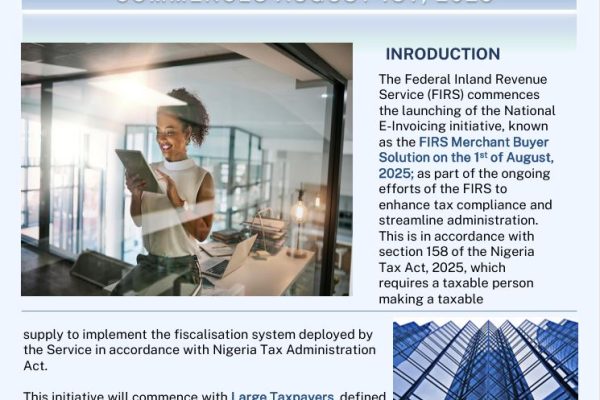Nigerian Tax Implications of Offshore Trust
INTRODUCTION
Offshore trusts are usually set up by High net-worth individuals (HNIs) and business owners seeking to ensure that their assets and investments are held to guarantee optimal returns and preservation of wealth. The generally adopted structure for this purpose is the Private Trust Agreement.
A trust is an arrangement whereby legal ownership of certain assets is transferred by an individual (the “Settlor”) to another party (the Trustee) to be held for the benefit of selected beneficiaries.
BENEFITS OF PRIVATE TRUST AGREEMENT
Helps to Preserve Family Wealth and Facilitates Intergenerational Wealth Transfer
Trust funds accumulated over a lifetime are not divided up amongst your beneficiaries after you have passed on but are retained as one fund to accumulate more wealth. Funds will have provision for payment to members of the family as the need arises while preserving some funds to continue growing.
Save Probate Cost and Delay (Legal Confirmation Process)
Establishing a trust enables you to avoid probate processes and the expenses related to it. This is because your passing doesn’t affect your trust property which will continue to be held and managed by the trustee or as directed by you in accordance with the terms of the trust.
Asset Protection
Existence of a trust protects your assets from creditors, unscrupulous business partners, immature family members or untrustworthy executors after you pass on.
Estate Plan
Your requests are carried out and in the case of a living trust; you will receive first-hand experience of how your wishes are adhered to.
Confidentiality
Trusts help keep the details of your assets confidential.
Assets will not go through Probate, a public procedure that allows State authorities to list your assets so the property can be assessed for estate duty and transferred to the beneficiaries as stated in the will.
The Personal Income Tax Act 2011 as amended (PITAM) states that an individual who is resident in Nigeria is taxable on his worldwide income. This entails that the income distributed to a Nigerian resident settlor or beneficiary from a trust is taxable in Nigeria. Also, where the Trust is administered in Nigeria, there is a risk that the entire income of the Trust will be taxable in Nigeria and not only the amount distributed could arise in certain situations.
Furthermore, there are various trains of thoughts as regards the Offshore Trust that supports the argument that only the amount distributed from an Offshore Trust to a taxable person in Nigeria will form a taxable income in Nigeria and not the entire income derived by the Offshore Trust from the assets/ investments held in trust. Therefore, although the income received from offshore trust and brought into Nigeria through a government approved channel will be exempted from tax, it is mandatory to be mindful of the nature of the nature of the offshore trust arrangement as the tax authority reserve the right to rely on section 54 of PITAM for assessing the settlor or beneficiaries of offshore trust as the case may be to tax on best of judgment basis.
PERSONAL INCOME TAX IN RELATION TO 2019 FINANCE ACT AND ORGANISATION OF ECONOMIC CO-OPERATION AND DEVELOPMENT (OECD)
The Minister of Finance who gave a warning, affirmed that Nigeria had written to a number of nations to request specific information about offshore trusts and bank accounts held by its citizens. Furthermore, one of the initiatives introduced by the OECD in combating tax
evasion is the Common Reporting Standard Regulations (CRS Regulations) which seeks to provide legal basis for the implementation of CRS in Nigeria. This follows Nigeria’s signing of the Multilateral Convention on Mutual Administrative Assistance in Tax Matters (MAC) and the Multilateral Competent Authority Agreement (MCAA) on the Automatic Exchange of Financial Account Information, signed by Nigeria on 17 August 2017.
Fundamentally, the CRS Regulations and the other agreements signed by the FIRS will allow it to receive specified information on the bank accounts and offshore trusts held by Nigerian tax residents in up to 105 countries. In exchange, the FIRS will be obligated to provide similar information to these other countries. The effective date of the CRS Regulation was 1 July 2019 and it requires every qualifying Nigerian financial institution to submit an electronic information return (i.e. a report that states the specified account information of certain persons) to the FIRS on annual basis.
Furthermore, it is important to note that Trustees who perform other key financial functions such as depository, custodial services, fund investment etc. fall within the definition of reporting financial institution under the CRS. This means that all the financial information of the various high net-worth individuals in Nigeria regarding their foreign bank accounts with any reporting financial institution in a CRS participating country is expected to be presented to the Nigerian tax authority. It is therefore mandatory to note that Offshore Trust arrangements usually provide these functions which in turn put the privacy and confidentiality enjoyed by the Settlor and Beneficiaries at risk.
On this note, where investigations are conducted and the relevant tax authority is able to obtain information on the distributions made by an Offshore Trust to a high net-worth individual that is tax resident in Nigeria, the relevant tax authority is able to use the information as a guide to subject the high net-worth individual to tax on the BOJ basis.
Furthermore, Section 49 of PITAM, as amended by the Finance Act, 2019 states that individuals are required to produce their Tax Identification Numbers (“TINs”) before they can operate new or existing banking accounts in Nigeria. Also, the Lagos State Internal Revenue Service went a step ahead to link tax payer identification numbers (“PID”) to the bank verification numbers (“BVN”) of Lagos State residents and this entails that the tax authorities in Nigeria are able to access the financial activities of high net-worth individuals especially as it relates to undisclosed income for tax purposes.
However, it is important to note that an Offshore Trust will be subject to the dynamics of changing tax, political and business climate of its place of administration. It is therefore important to have clear understanding as regards the prevailing practice in any jurisdiction before setting up a trust in such jurisdiction.
CONCLUSION
These are interesting times for taxation in Nigeria as Government officials seem to be taking tax compliance and monitoring up a notch in order to achieve the ultimate goal of increased revenue generation.
It is therefore paramount for Nigerians to pay more attention to their personal tax practices while also engaging professionals if the need arises in order to avoid the trouble of being caught unaware.











